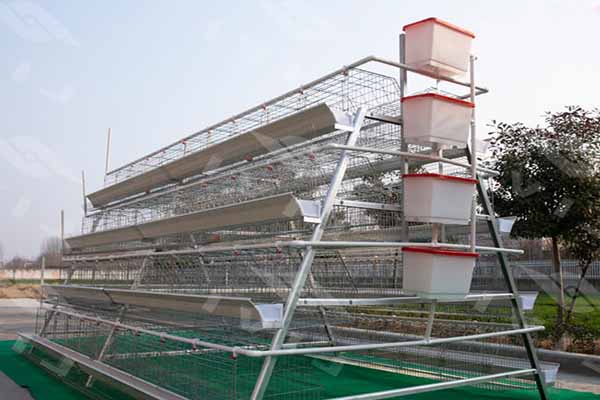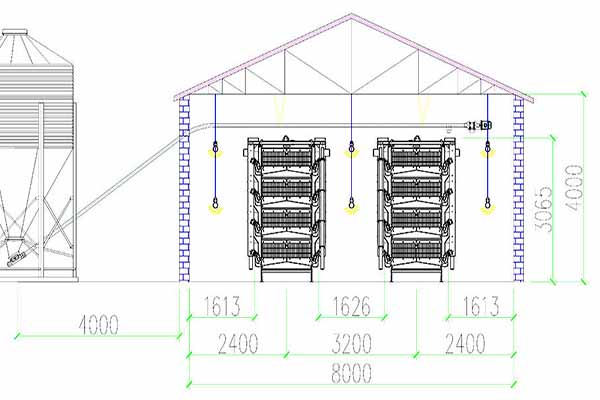Tanzania’s Large-Scale Poultry Farming: Strategies and Equipment for Success
Time : 2025-06-30
In recent years, Tanzania has seen a significant growth in the poultry industry, particularly in large-scale farming operations. This article delves into the strategies and equipment used in Tanzania’s large-scale poultry farming, providing valuable insights for those looking to venture into this lucrative sector.

Introduction to Large-Scale Poultry Farming in Tanzania
Tanzania’s poultry industry has experienced remarkable growth, thanks to increased consumer demand for poultry products and government support. Large-scale poultry farming plays a crucial role in meeting this demand, contributing to food security and economic growth. This section explores the key aspects of large-scale poultry farming in Tanzania.
The Growth of the Poultry Industry
The poultry industry in Tanzania has been growing at an annual rate of 5-6%, driven by urbanization, rising incomes, and changing dietary preferences. The industry is estimated to be worth over $200 million, with the potential for further expansion.
The Role of Large-Scale Farms
Large-scale poultry farms are at the forefront of this growth, providing a consistent supply of high-quality meat and eggs. These farms often have a production capacity of over 10,000 birds, ensuring economies of scale and efficient operations.
Strategies for Success in Large-Scale Poultry Farming
Success in large-scale poultry farming requires a combination of effective strategies and sound management practices. This section outlines some key strategies used by successful poultry farmers in Tanzania.
1. High-Quality Feed
High-quality feed is essential for healthy birds and optimal growth. Tanzania’s large-scale poultry farms often source their feed from reputable suppliers, ensuring that it meets the nutritional requirements of the birds.
2. Biosecurity Measures
Biosecurity is crucial in preventing the spread of diseases that can decimate a poultry flock. Large-scale farms in Tanzania implement rigor ous biosecurity protocols, including the use of disinfectants, restricted access to the farm, and regular health checks.
ous biosecurity protocols, including the use of disinfectants, restricted access to the farm, and regular health checks.
3. Efficient Management Practices
Effective management practices, such as regular monitoring of bird health, optimal housing conditions, and timely vaccinations, are vital for the success of large-scale poultry farming operations.
4. Marketing and Distribution
Access to markets is essential for the profitability of large-scale poultry farms. Successful farmers in Tanzania establish strong relationships with retailers and distributors, ensuring a steady flow of products to consumers.
Equipment for Large-Scale Poultry Farming
The right equipment is essential for efficient and successful large-scale poultry farming. This section discusses some of the key equipment used in Tanzania’s poultry industry.
1. Brood er Hatching Systems
er Hatching Systems
Brooder hatching systems are used to incubate eggs and provide a controlled environment for newly hatched chicks. In Tanzania, advanced systems like the Hova-Bator are popular, offering precise temperature and humidity control.
2. Feeders and Drinkers
Automated feeders and drinkers are essential for providing birds with a consistent supply of feed and water. These systems help to reduce labor costs and ensure that birds receive the nutrients they need for optimal growth.
3. Ventilation and Environmental Control Systems
Proper ventilation and environmental control are crucial for maintaining optimal conditions within the poultry house. In Tanzania, modern systems that use fans, misters, and climate controllers are commonly used.
4. Processing Equipment
For large-scale poultry farms, processing equipment is essential for handling birds efficiently and hygienically.屠宰设备 like killing stations, plucking machines, and evisceration systems are commonly used.
Conclusion
Large-scale poultry farming in Tanzania has become a vital part of the country’s economy, providing food security and economic opportunities. By implementing effective strategies and utilizing the right equipment, poultry farmers can ensure success in this competitive industry.











